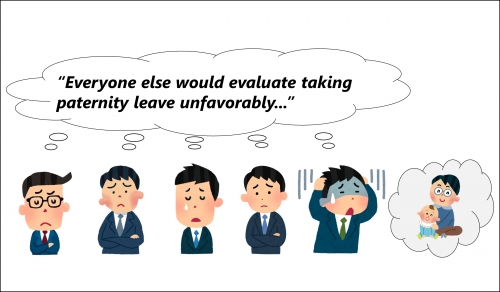研究成果 Research Results
- TOP
- News
- Research Results
- What is the factor that prevents men from taking paternity leave? Psychological barrier that stems from erroneous beliefs
What is the factor that prevents men from taking paternity leave? Psychological barrier that stems from erroneous beliefs
2017.09.29Research ResultsHumanities & Social Sciences
The research group led by Professor Hiroyuki Yamaguchi and Takeru Miyajima have revealed that Japanese male employees misperceive other male employees’ beliefs toward paternity leave as more negative than these beliefs actually are. Furthermore, this misperception inhibits the behavioral intention to take paternity leave, despite they aspire to take such leave.
The number of male employees who take paternity leave in Japan has been low in past decades. However, the majority of male employees actually wish to take paternity leave if they were to have a child. Here, assuming that most of the male employees have positive attitudes toward paternity leave, how is this gender-unequal social practice persisted?
The research group focused on the social psychological phenomenon “pluralistic ignorance”, which refers to the situations in which almost all members of a group privately reject group norms, yet believe that virtually all other group members accept them (Fig 1). The group examined the association between pluralistic ignorance and paternity leave in Japan by conducting online questionnaires targeted at Japanese male between 20 and 49 years of ages.
The results show that those who had positive attitudes toward taking leave and attributed negative attitudes to others (self-other discrepancy) were less willing to take leave compared to those who had positive attitudes and believed others shared those attitudes (positive groups), though there was no difference between their desires to take leave (Fig 2).
For more information about this research, see
Miyajima, T., & Yamaguchi, H. (2017). I want to but I want to but I won’t: pluralistic ignorance inhibits intentions to take paternity leave in Japan. Frontiers in Psychology. 8:1508.
DOI: 10.3389/fpsyg.2017.01508

Fig. 1.
Paternity leave in Japan and pluralistic ignorance

Fig. 2.
Behavioral intentions by group
Journal Reference
I Want to but I Won't: Pluralistic Ignorance Inhibits Intentions to Take Paternity Leave in Japan, ,Frontiers in Psychology, 10.3389/fpsyg.2017.01508Research-related inquiries
Hiroyuki Yamaguchi, Professor, Department of Psychology
Takeru Miyajima, Doctoral student, Graduate School of Human-Environment Studies
Takeru Miyajima, Doctoral student, Graduate School of Human-Environment Studies
- TOP
- News
- Research Results
- What is the factor that prevents men from taking paternity leave? Psychological barrier that stems from erroneous beliefs































